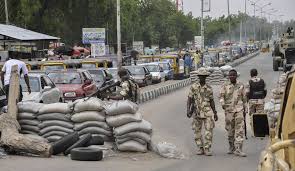 |
| Nigerian Soldiers at a Check Point |
It’s a common scene along Nigeria’s main roads -- barriers stopping cars, machine-gunners poised behind sandbags and stern-looking soldiers checking vehicle trunks and scrutinizing the faces of passengers.
While soldiers held power for 29 years and have always played an internal security role in Nigeria, their deployment has surged since former military ruler Muhammadu Buhari won the presidency in 2015. Operating in all 36 states, they’re dealing with a range of crises: Islamist militant attacks in the northeast, simmering unrest in the oil-producing Niger River delta, conflict between crop farmers and herders and widespread robberies and kidnapping.
Buhari approved $1 billion in weapons purchases, Defense Minister Mansur Dan Ali said Wednesday after a meeting of the nation’s security chiefs in Abuja, the capital. Army chief Tukur Buratai last month announced the creation of two new divisions and six brigades in what he described as a response to Buhari’s directive to expand the footprint of the military nationwide.
“The increasing deployment of military forces for internal security operations across the country underscores the profoundly dysfunctional state of Nigeria’s public safety institutions, particularly the ineffectiveness of the police force,” said Nnamdi Obasi, West Africa analyst for the Brussels-based International Crisis Group.
Sophisticated Weaponry
“The kind of criminality and the kinds of weapons being used have reached a level of sophistication to a point that the police doesn’t have the capacity to handle it and the military has to come in,” said Defense Ministry spokesman John Agim. “The situation isn’t good for the military; it’s not good for the police.”
Special forces are being deployed in the northwestern state of Zamfara to battle gangs of bandits that have carried out repeated attacks on villages, Nigerian Air Force spokesman Olatokunbo Adesanya said Wednesday in an emailed statement. At least 32 people were killed in the latest raid last week that targeted the village of Bawan Daji.
The police are stretched, as many officers are assigned to personal security details. At least 150,000, more than a third of the total force, guard so-called “big men” -- politicians, government officials, and the wealthy, according to figures released by the Police Service Commission. That leaves 250,000 cops for the rest of Nigeria.
Manpower Shortage
“Look at the numbers: We are 180 million people and we have 400,000 policemen in the country,” presidential spokesman Garba Shehu said by phone. “The police can’t be everywhere because of their low number.”
Police Inspector-General Ibrahim Idris said on March 22 that all police personnel assigned to individuals will be recalled later this month to tackle the manpower shortage. With Africa’s top oil producer preparing for general elections in February, political tension is building as campaigns start to get underway. Buhari, 75, hasn’t said if he’ll seek re-election.
Cooperation between the two forces often breaks down. In February, when the Islamist militant group Boko Haram abducted 110 schoolgirls in the northeastern town of Dapchi after soldiers had withdrawn, the military said it’s the police’s job to ensure public safety. The police responded by saying the army never officially handed over the area.
Political Risk
The military’s involvement in policing is also fraught with risks of politicization in a country of more than 250 ethnic groups almost evenly split between a mainly Muslim north and a predominantly Christian south. Under Buhari, most of the top security commands are run by trusted aides who are fellow northern Muslims.
While the military under Buhari was successful in driving Boko Haram fighters from northeastern towns they previously occupied, it’s facing violence in areas such as the central part of the country where mainly Christian farming communities are battling mainly Muslim herders over grazing land.
Former army chief and Defense Minister Theophilus Danjuma accused the military last month of aiding herders who are in conflict with crop farmers and urged people to form self-defense groups.
“For a former military chief and defense minister to say this, it does warrant some investigation,” said Clement Nwankwo, executive director of Abuja-based Policy and Legal Advocacy Centre.
Army Muscle
Presidential spokesman Garba said such declarations could inflame public opinion and threaten national security. “We must be careful to avoid the mess that destroyed other African countries like Somalia,” he said in a statement.
The Buhari administration has a “basic inclination” to respond to internal security challenges with army muscle, according to Crisis Group’s Obasi, and it needs to do more to seek non-military solutions.
Last month the government did just that, using what Information Minister Lai Mohammed described as back-channel contacts to secure the release of almost all of the abducted schoolgirls from Dapchi. And the government hopes to start negotiations to end the nine-year conflict with Boko Haram, he said.
“Episodic deployment of military forces will not solve Nigeria’s internal security challenges,” Obasi said. “What is needed are constitutional, political and administrative responses to grievances and demands in various parts of the country.”
Culled from: Bloomberg
No comments:
Post a Comment
What are your thoughts on this post?